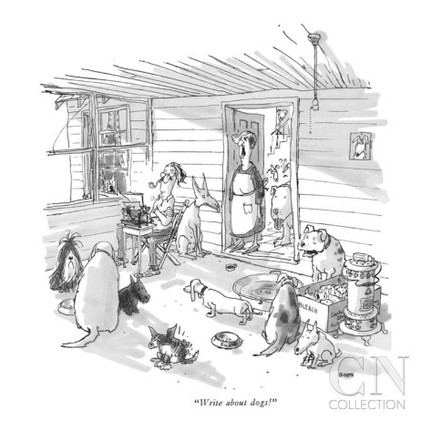 I’m a big-time dog-lover, embarrassingly so to my husband as I gush over dogs that I’ve been assured are friendly on our journeys this year. As someone who cares about the poor, I do worry about what we dog-owners in the more-developed world spend on fancy pet food and end-of-life surgeries for dogs we’re unwilling to let go of. But I also think there’s something humanizing and just downright joyful about caring for dogs and receiving their loyalty in return. Jonah Goldberg’s recent piece on why dog-lovers make better parents backs me up on that. So it’s been sad for me to see mangy, neglected dogs roaming the streets of several countries in Eastern Europe and Central Asia. As a new friend in one place said, “Here, they’re not fenced in; they’re fenced out.” Another friend said that men in one of those countries actively use the dogs in the streets as a target for their aggressions, kicking them and yelling at them on their way home from hard work days. Where dogs are not liked, they tend to become not-very-likable creatures. And certainly in some parts of the world, dogs are also called, “Dinner.” All along the way this year I’ve been asking the question, “What can Americans helpfully bring to the work of God’s kingdom in less-developed countries?” Specifically, what can we still bring? Shouldn’t we hand it all off to local leadership about now? Zealous western missionaries poured into former Soviet Union and Soviet Bloc countries as the USSR collapsed, and a burst of good did result. Churches were birthed, conversions happened, and many of them stuck. We’ve probably met or at least worshipped with hundreds of people who became Christians during that heyday. Some of that zeal was misplaced; some even caused real harm. Flash-in-the-pan, large-scale evangelistic crusades and concerts left American Christian rock bands and evangelists with big numbers to report but questionable lasting fruit. The dust has solidly settled and the work on the ground has been hard. The window of curiosity and openness is fairly closed, conversion rates are way down, and some congregations are aging and declining just as they are in the US. The economies have followed a similar trajectory: the burst of hope capitalism initially brought has given way to a grim, trudging hopelessness as the corruption that flourished under communism remains deeply entrenched, and the forces that crush entrepreneurial endeavors grind on. In the face of all that, I think American Christians bring a crucial quality that is still precious here: hope. We are a hopeful bunch. We’ve tried some things, and sometimes, by golly, they’ve worked. A whole bunch of us decided we’d had enough of Europe (and later Asia and elsewhere) and packed ourselves into cramped ships to try our luck at something new. Another bunch subsequently said they’d had enough of New England winters and headed off for even more new. Once we got there we experimented again and again; some of the most innovative industries in the US are on the West Coast for a reason. (I’m admittedly telling my story as a white, Euro-descended person here. That’s partly because I’ve enjoyed learning for the first time about my direct ancestors while seeing the harbor in Falmouth that was their jumping-off place. I know that another bunch of us came from Africa involuntarily, in far crueler ships, and endured brutal treatment as slaves. The indomitable spirit and faithfulness found in that community despite ongoing injustices faced there testifies to an even deeper strain of hope.) I think that we North Americans still can bring hope, and hopefulness, as a gift to cultures that have a tenuous hold on it for all sorts of reasons. We need to be careful that we aren’t just importing a cheerful optimism born of how well things have worked out in our case. We need a tempered, rich hope, one that has been forged and made strong by enduring suffering with faith. But we also do bless others when we bring an innocent, exuberant, child-like hope. (For all the inadvertent harm they may have caused, those crazy YWAM-er’s and Baptists went, back when living conditions were extremely challenging, and lives were changed in beautiful, gospel-good ways.) What’s easier for me to picture, though, is a dog-like hope. My Labrador dog Luna’s tail is a force of nature. It’s heavy and huge and makes a rowdy racket when she bangs it on the kitchen cabinets while getting a rub-down from me at the end of the day. She’s just that glad to see me. Hope rises up within her that of all her favorite dreams are about to come true: “A walk! Around the whole neighborhood! Followed by a bowl of food! Then more petting! Does it get any better than this?” I think Americans are kind of the Labrador dogs of the world. We are quick to warm up to strangers, loyal and eager and friendly, and remarkably optimistic.  We’ve been in Cornwall the last four days, getting a little downtime before our last eight weeks of resourcing IFES staff and students. Aside from the stress of driving on the left side of the road with a steering wheel on the right side of the car, on roads bumpy enough to cause a flat tire in the middle of nowhere (we figured out how to uncheck ‘unpaved roads’ from our navigational app and added four miles to one recent short journey), we have loved the beautiful countryside and the friendly, open people. Whatever you’ve heard about British reserve doesn’t seem to us to apply here. People will chat on the streets with strangers at the drop of a hat, or invite you into their farmhouse for a cup of tea if you merely tell them your great-great-grandparents once farmed there, as I did the other day. Or invite you in for more tea while you’re waiting for roadside assistance for that flat tire. And they are amazingly patient with American incompetence on the roads. They just keep smiling and waving. It strikes me as not coincidental that they really, really love dogs here. Labradors specifically. They are everywhere, even gracing the more casual restaurants and pubs. Tilly, a black lab at one farm, became my new best friend, rubbing her dirty body all over my jeans when I threw her favorite stick for ten minutes. I’ve gotten my dog fix, which will hopefully last me until my reunion with my dear old Lunatic (my nickname for our dog Luna, except for when she’s sleeping, when she becomes Lunesta…and I’ll just keep to myself what her ‘Luna Bars’ are in my nomenclature). The time here has been a gift, a restorative treat from a generous God, even down to giving me a big dose of Labrador dog while here. I will try in my turn to bring the open heart of love and the cheerful, hopeful approach to life that Lab dogs offer, even at the risk of whacking someone with my too-enthusiastic tail on occasion.
1 Comment
Gayll Phifer-Houseman
6/25/2015 10:35:16 am
So glad the Lord gave you a little dog-love after being willing to leave that love at home for a whole year. I like the analogy----add a little athletic, persistent and rambunctious Chesapeake to the mix (one of the two true American breeds) and I'm with you all the way! :) Go Dog, Go!
Reply
Leave a Reply. |
Archives
April 2024
AuthorRich and Lisa Lamb Categories |
 RSS Feed
RSS Feed